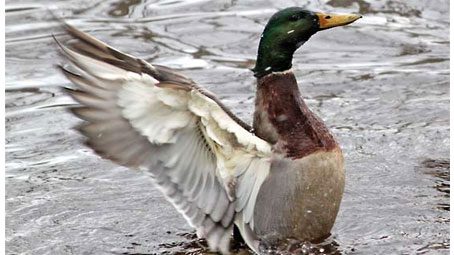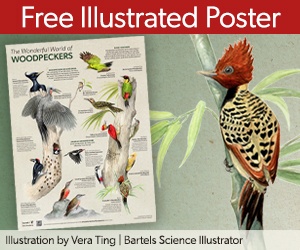Investigating Behavior: New Courtship and Rivalry Course
Story and photos by Kevin McGowan
April 15, 2010
Online course shows how to interpret behavior
Ducks in a park pond swim, they quack, they flap their wings, they bathe. But did you ever notice that a bathing Mallard always ends by sitting up in the water, flapping its wings, bending forward, and shaking its tail in the air, often dipping its bill into the water? Mallards go through this whole sequence, every time. Have you noticed other behaviors that seem to follow a set pattern or ritual? Displays like this are often used to communicate with other birds.
Some bird communication is loud and conspicuous, like a male Red-winged Blackbird flashing his red wings and calling to defend his territory. But birds communicate in more ways than you might imagine, and many important displays are subtle and easily missed. It often takes a second (or third) look to discover what is going on and most of us don’t think to stop and try, or don’t know how to begin.
Our new online course presented by eCornell, Courtship and Rivalry in Birds, is designed to help students see into this easily overlooked world of bird visual communication. The course focuses on signals that help birds attract mates and hold territories, and uses examples of birds from your backyard and from across the world. The media-rich interactive exercises, spectacular videos, researcher interviews, and self-quizzes help develop observational skills that take birding beyond identification into interpretation.
Recent graduates of the course have commented that what they learned will add scope to their bird watching and make it more fulfilling. As one student put it, “This course has given me a new view on an old pastime.”
For more information or to enroll, visit www.birds.cornell.edu/courses.
Originally published in the Spring 2010 issue of BirdScope.

All About Birds
is a free resource
Available for everyone,
funded by donors like you
American Kestrel by Blair Dudeck / Macaulay Library
